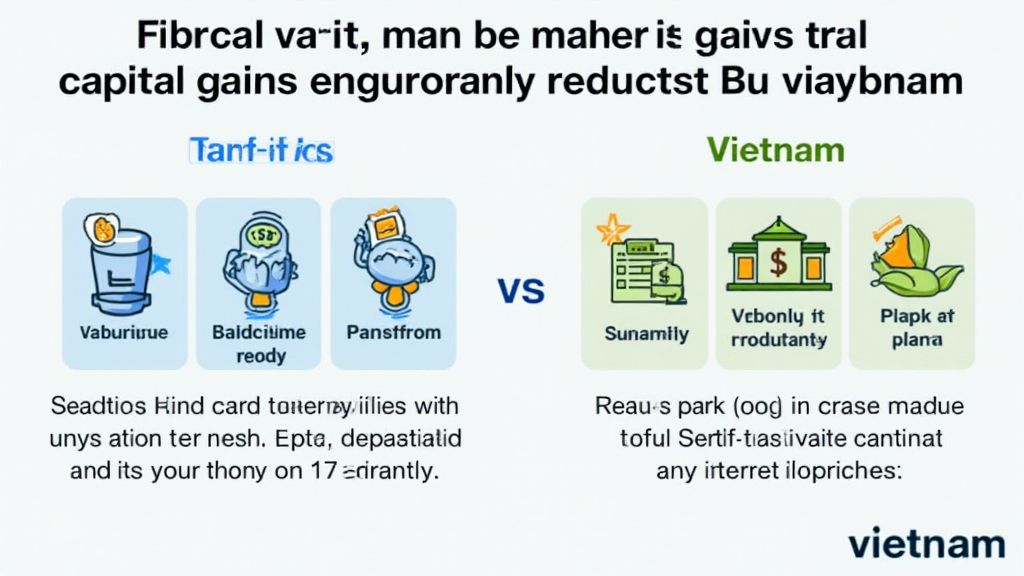Understanding Vietnam’s Capital Gains Tax for Cryptocurrency Investors
As the world dives deeper into the digital age, cryptocurrency has emerged as a formidable contender in global finance. In Vietnam, the demand for cryptocurrency has surged, with a reported 47% growth in crypto users in the past year. However, with this growth comes the necessity for understanding the legal and fiscal responsibilities that accompany crypto investments, particularly the capital gains tax. With uncertainties looming around the tax implications for crypto transactions, it’s vital for investors to grasp how the regulations in Vietnam affect their investments.
What is Capital Gains Tax?
Capital gains tax is applied to the profit gained from the sale of a capital asset, such as real estate, stocks, or cryptocurrencies. When investors sell these assets for more than their purchase price, the profit incurred is considered a capital gain. In Vietnam, any profit from the transfer of cryptocurrencies falls under this tax jurisdiction, necessitating adherence to local regulations. However, the landscape of cryptocurrency taxation can be intricate, often raising questions among investors.
Vietnam’s Tax Regulations on Cryptocurrency
In Vietnam, the handling of cryptocurrency taxation has been gradually evolving. As per current legal frameworks, cryptocurrency transactions are recognized as taxable events. Here’s a breakdown:

- The capital gains tax on cryptocurrencies is categorized under the income tax, where profits from crypto trades are subject to a rate of approximately 20% as per the current corporate income tax law.
- Regardless of the type of digital asset exchanged, documentation is crucial. Investors must keep meticulous records of their transactions, as this will determine the capital gains.
- Individuals selling cryptocurrencies are required to declare their income accurately, as failure to do so can lead to fines and penalties.
Are There Exemptions or Deductions?
In Vietnam, there are minimal exemptions regarding capital gains tax. However, there are allowances for certain situations. For instance:
- If a cryptocurrency is held for an extended period (exceeding one year), the profits may be treated differently under specific circumstances, although documentation is still necessary.
- Investors may offset some losses against capital gains, thus reducing taxable income, though this requires clear and thorough documentation.
The Importance of Record Keeping
For cryptocurrency investors, record keeping is not just an advisable practice; it is essential. In Vietnam, local authorities demand precise records to streamline the tax-filing process. A well-documented transaction record includes:
- Date of purchase and sale
- Amount spent vs. amount received
- Wallet addresses used for transactions
- Any intermediary exchanges, as many traders operate through platforms not directly linked to Vietnamese regulations.
Consideration of these elements can significantly ease tax filing and help avoid unwanted scrutiny from the authorities.
Local Cryptocurrency Market Trends
According to a recent study by HIBT, Vietnam ranks among the top 10 countries in cryptocurrency adoption worldwide. The Vietnamese government has shown continued interest in digital assets and blockchain technology, leading to a nurturing yet careful regulatory environment. Interestingly, over 3 million Vietnamese are currently engaging in digital asset trading.
Tax Filing: A Step-by-Step Guide
Filing taxes can be complex, especially when dealing with cryptocurrencies. Here’s a simplified process investors in Vietnam can follow:
- Document each transaction: Include dates, amounts, and any gains or losses incurred.
- Calculate total capital gains: Use your documented records to calculate profits from your trades.
- Complete tax forms: Use the designated tax forms required by the Vietnamese Ministry of Finance.
- Pay any due taxes: Ensure to submit tax payments by the established deadlines to avoid fines.
Engaging with Tax Professionals
Due to the complexity of cryptocurrency investments and taxation, collaborating with a tax professional familiar with Vietnam’s regulations is highly recommended. They can provide essential guidance and help navigate the frequently changing landscape effectively.
Conclusion: Stay Informed, Stay Compliant
As Vietnam continues to develop its cryptocurrency framework, investors must remain informed about rules, especially concerning capital gains tax. Ensuring compliance not only protects assets but also fosters a healthier investment environment in the long run.
In summary, understanding the capital gains tax within Vietnam is crucial for crypto investors. By maintaining comprehensive records, seeking professional advice when necessary, and staying updated on regulations, individuals can effectively manage their tax obligations and optimize their cryptocurrency portfolios.
For more resources on navigating Vietnam’s cryptocurrency landscape, visit bobscoinsonline.



